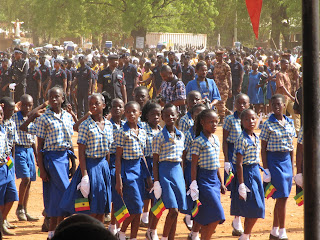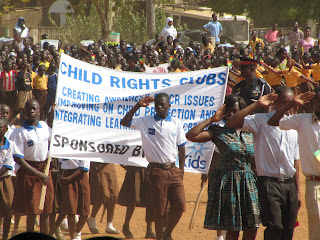Death in Ghana is inevitable,
expected, often premature, unexplained for the most part, and although
respected most vigorously, not a shock for it is in fact part of everyday life
here for the most Ghanaians. Pretty much
every weekend they travel for a funeral through the dry season
The second night in Zebilla on my
last visit we went to ‘Container’ for food.
Ali had often spoken about the infamous Z Town ‘Container’. I have to say it was much more than I
imagined for some reason. We were
escorted by Ibrahim, a nine year old neighbour of Emma’s who just came along
for the ride (and probably the uneaten food!) Unfortunately there was obviously
something terrible going on as we headed home as there was a fire truck in the
dirt track. The fire man told us that
they had word that a child had fallen down a well. We had to find what had happened… One, Emma was concerned it was one of the
many children she supports in the neighbourhood and two, if the child needed
help we could do something practical.
After a long walk headed up by Ibrahim who knew the way to the compound
the wailing from the women was a clear indication of what had happened. Little Bashira had died in the well. She was about two. We were too close to the compound to turn
around and run, we had to greet the family and pay our condolences. We were told we were free to see the child…
the body. It’s what they do here… stand
vigil over the body all night. They bury
bodies the next day but we couldn’t.
Funerals can follow months after
the burial, years even. They are a big
and lavish affair that the family saves up for which for the immediate family
can last up to one week. A friend
recently went to his Uncles funeral that had died last year in a moto accident
with a truck in the early hours of the morning after leaving the local night
club. The first day the funeral started around 7pm. All the elders attend this part of the
funeral where all the traditions are upheld and certain rituals are performed in
the early hours of the morning, most people remain all night, drumming,
drinking pito (a local alcoholic brew), not stopping until dawn. The funeral continued for two more full days,
with music, food and drink for everyone.
It will last for so many days to allow family and friends to travel to
the family home and pay their respects; a consequence of this is the immediate
family need to be there to receive their guests who could have travelled for
miles to pay their respects…
Only recently the daughter of a
woman I’ve worked with died. She’d been sick for some time. I’d spent some time with her. Drank in the local spot with her, held her
baby who is still under a year. Despite travelling to Tamale hospital they still couldn’t pinpoint the problem. This was so shocking for me, I was
devastated. Not just because I knew of
her but because I know how much effort her mother had gone to trying to make
her better.. but to no avail. The more I
get to know people here the more likely it is that this could happen to someone
I really know well.
Death of pregnant mothers,
babies and infants is far too high here... and begs the question why? The
stories I’ve heard that relate to hospital negligence in these cases is shocking. For most, if you are educated, you can push
for more, question diagnosis and raise expectations of the hospital staff, but
most people here in the north are illiterate and uneducated and bamboozled by
the very educated doctors. They are too
frightened and unsure of how or what to ask. So they don’t , with tragic consequences.
It has upset me that death is so
expected here and yet not questioned.
It’s always ‘gods will’. Only the
rich can afford autopsies. Sometimes it
is widely thought that a person died because they had been cursed or poisoned
according to the traditional beliefs because of some wrong doing, or someone
else wronging them. Complicated, but when I think more about it, if I lived
here for longer, I believe I would start to believe it is ‘gods will’; much easier
to digest than the truth, (hospital negligence being high on that list of
truths) for those truths might just send you a little crazy…








































